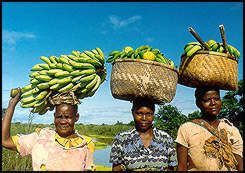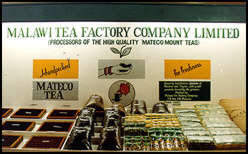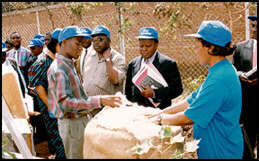 AGRICULTURE: DIVERSIFYING AND EXPANDING AGRICULTURE: DIVERSIFYING AND EXPANDING |

Malawi’s focus to increase trade and exports is coupled with a strategy to modernize and diversify the agricultural sector. As the country’s main economic activity, agriculture contributes to 37 percent of the country’s Gross Domestic Product (GDP) and over 90 percent of the national employment.
Historically, Malawi has been a strong producer of tobacco, which is currently the country’s leading export crop and accounts for 68.26 percent of the country’s foreign exchange earnings. However, dropping tobacco prices and falling international demand has hit the country hard, and what used to be a profitable industry is now a dying market.
Having said this, Malawi’s dependence on tobacco is costing the country a great deal. "This is where the problems of the Malawi economy come from – 70% of our foreign exchange earnings are from tobacco, which is too high for only one crop" indicates Malewezi.
"Our previous concentration on tobacco has taught us the lesson that when you are concentrating on a product which faced problems like tobacco is facing right now, then the whole economy is destabilized to a situation where farmers will have to allocate resources to other crops other than tobacco" said Friday Jumbe, General Manager of the Agricultural Development and Marketing Corporation (ADMARC).
So far, efforts to bring in new sources of foreign currency from agriculture have not been very successful, and no single crop has emerged to replace the profitability of tobacco. "Malawi grows tobacco out of necessity because it has no alternative export commodity" says Leonard Mangulama, Minister of Agriculture and Irrigation Development. "It is the lifeline of the country."
However, future prospects are improving for the country as new crops are being grown and developed for strategic export markets.

Tea and sugar crops are growing in importance and new business opportunities are being developed for products such as maize, groundnuts, rice, vegetables, cotton and coffee.
Companies like Commodity Processors (Pvt.) Ltd. (COMPRO) are successfully profiting from Malawi’s agriculture potential by distributing chemical-free commodities for export markets. COMPRO is a leading agriculture company which processes and manufactures split lentils and exports other agricultural commodities such as pigeon peas, maize, sugar beans, chilies, chick peas, maize, soya beans, groundnuts and sunflower seed.
In fact, COMPRO has used Malawi’s strategic position as a launching pad for regional and international trade. Although Malawi is often labelled as a ‘land locked’ country with no direct access to outbound ports, Abbas Mukadam, Managing Director of COMPRO, has had no problem expanding his business globally. | "People see the land lock issue in Malawi as a disadvantage" says Mukadam, "but regionally it is actually an advantage, because from Malawi you actually have greater and easier access to other countries in the region than you would from Zambia, Botswana, Zimbabwe, Tanzania or Mozambique, for instance."
From his head office in Malawi, Mukadam sells to 16 countries and 5 continents. "We are dealing in markets that are growing and also have an international range, so we are not restricting ourselves locally or even regionally."
A strong international demand for split lentils and other commodities has brought COMPRO to new heights, and Mukadam is expanding his business and building global partnerships. "What we are doing is linking away from Malawi to the global village by picking leading companies and building strategic alliances" states Mukadam. The success of COMPRO has shown that Malawi can be an international player in the agricultural sector.

Another important player in the sector is ADMARC, which has experienced somewhat of a transformation in the past few years from being a state-owned monopoly to a leaner, more focused corporation. Although tobacco remains the main crop for ADMARC in terms of capital outlay and the realized revenue, ADMARC is also adopting new technologies and specializing in the distribution of certain commodities such as cotton, groundnuts, chillies and maize.
ADMARC controls almost 60% of marketed agricultural volumes, acting as a unique support structure which can mobilize the activities of small farmers and create a significant consolidated output of various agricultural products. "What Admarc is able to offer is the consolidation of a small sector, very fragmented and diverse, with a strong impact because of the services we can offer" states Friday Jumbe.
By building partnerships with local farmers and working with them to diversify their crops, then mobilizing outputs and creating added-value products, ADMARC is positioning itself as catalyst for agricultural growth and diversification. "What I see is an awakening and change of policy towards achieving greater output from the small farm holder" says Jumbe. "Our leadership will actually set the pace and lead the way for private investors to come into Malawi. That is what we think should be the role of Admarc, and that should also be the role of agriculture."
Jumbe admits that diversification and forward integration has not taken place as quickly as it should have. "However," he adds, ‘once the product is available in Malawi, you simply have to add value before you start exporting it, so that it has a base for agro-processing as well".
Mukadam agrees, saying that he can see great "potential for growth in Malawi in agro-processing for export, both regionally and internationally." With this in view, it seems clear that Malawi could become an important launching pad to new markets.
This vision of the future growth of Malawi’s agricultural sector is certainly one of the keys to success of both COMPRO and ADMARC. By developing new products and opening new export markets, they are quickly building and expanding their own businesses. Meanwhile, the country is diversifying its agricultural sector and opening up new opportunities for growth and development. |

